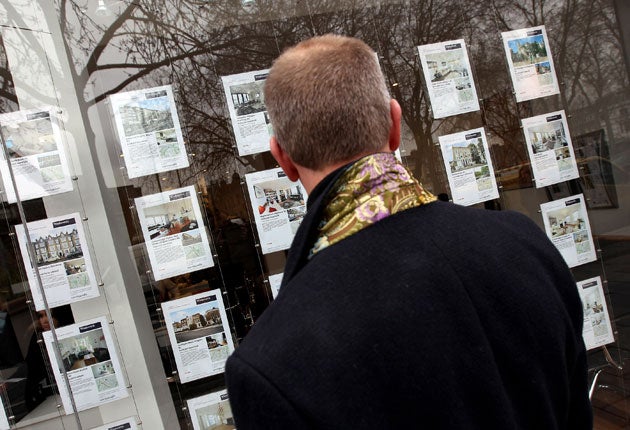
Your support helps us to tell the story
From reproductive rights to climate change to Big Tech, The Independent is on the ground when the story is developing. Whether it's investigating the financials of Elon Musk's pro-Trump PAC or producing our latest documentary, 'The A Word', which shines a light on the American women fighting for reproductive rights, we know how important it is to parse out the facts from the messaging.
At such a critical moment in US history, we need reporters on the ground. Your donation allows us to keep sending journalists to speak to both sides of the story.
The Independent is trusted by Americans across the entire political spectrum. And unlike many other quality news outlets, we choose not to lock Americans out of our reporting and analysis with paywalls. We believe quality journalism should be available to everyone, paid for by those who can afford it.
Your support makes all the difference.Mortgage approvals slumped to their lowest number in at least 15 years last month, a high street banking report said today.
There were 51,610 mortgage approvals in June worth £6.5 billion, the lowest number of approvals the British Bankers' Association (BBA) has on its records, which stretch back to September 1997.
Within these figures, there were 26,269 approvals for house purchase worth £4.2 billion, the lowest number since January 2009. House purchase approvals are a fifth lower than they were a year ago.
There were just over 14,000 approvals for re-mortgaging, worth £1.9 billion, well below the longer-term average which is close to 20,000 approvals.
The BBA said the public holidays for the Diamond Jubilee and the impact of the wet weather on buyer activity affected the figures while the appetite for borrowing among consumers remained weak in the "subdued" housing market.
Lenders have also been tightening their borrowing criteria in recent months and raising their rates for new borrowers and more than a million existing ones, blaming the weak economy and the increased cost of funding a mortgage.
The Bank of England expects borrowers with lower deposits to have a particularly tough time taking out a mortgage in the coming months.
BBA statistics director David Dooks said: "Public holidays and wet weather put a damper on mortgage approvals in June and demand for unsecured (non-mortgage) borrowing was also low.
"Paying off loans or overdrafts and building up deposits is the current consumer ambition."
The BBA reported last month that mortgage payments had outstripped lending for the first time, as net mortgage lending declined by around £70 million.
The figures for June showed a net mortgage lending increase of £342 million. But the report said that declining levels in lending and a rising trend in people trying to pay down their mortgages as interest rates remain low by historic standards means that significant increases which had previously been seen in net lending each month have "largely disappeared".
Analysts said the low number of approvals for house purchase could indicate that house prices will be pushed down in the coming months and lending could well remain weak for the foreseeable future.
Ed Stansfield, chief property economist at Capital Economics: "This is the best guide to the level of active housing demand and, potentially, a signal of the short-term outlook for house prices.
"It is a concern, therefore, that at around 26,300 in June, approvals for house purchase have only ever been lower at the depth of the 2008/09 credit crunch."
Mr Stansfield thought it likely that mortgage approvals will rebound a little this month, but warned against dismissing last month's weak figures because of short-term factors like the weather.
He said: "After all, markedly weaker mortgage lending would seem to be consistent with reports that credit conditions are tightening and that mortgage interest rates rose during the second quarter.
"It would also square with the fact that the economy has lapsed back into recession and the fragile levels of consumer confidence."
Mr Stansfield said a new "funding for lending" scheme announced by the Bank of England and the Treasury could help stop mortgage availability becoming even more restricted.
He added: "Even so, without a material boost to confidence, the outlook for mortgage lending for the foreseeable future is surely still very weak."
The figures also follow the ending of a two-year stamp duty concession for first-time buyers in March, which lenders and estate agents said had the effect of bunching up house sales which could have otherwise taken place later this year.
The BBA report also showed how cautious consumers have continued to shore up their savings and pay down their debts.
Personal deposits rose by 5.1% over the 12 months to June, boosted by a strong year for people putting money into tax-free Isas, the BBA said.
High street banks saw a £16.1 billion flow into cash Isas in the first half of 2012 compared with £10.2 billion in the same period last year.
Analysts have said competition among Isa providers has been particularly strong this year, with many deals having short timeframes for take-up.
Meanwhile, outstanding unsecured lending, which includes credit cards, overdrafts and loans, contracted by 2.3% over the 12 months to June. Some £80.2 billion was outstanding in net consumer credit.
Consumers continued a long-standing trend of paying more off on their credit cards than they spent, with £7 billion in new spending on cards in June and £7.2 billion repaid.
The report said borrowing demand from industry remained "subdued" in June as many firms tried to reduce their debts. Net lending to non-financial businesses saw a £3.2 billion drop in June.
Mr Dooks said: "Business output remains weak, so demand for finance is subdued, with companies tending to delay investment and concentrate on reducing their bank debt."
PA
Join our commenting forum
Join thought-provoking conversations, follow other Independent readers and see their replies
Comments